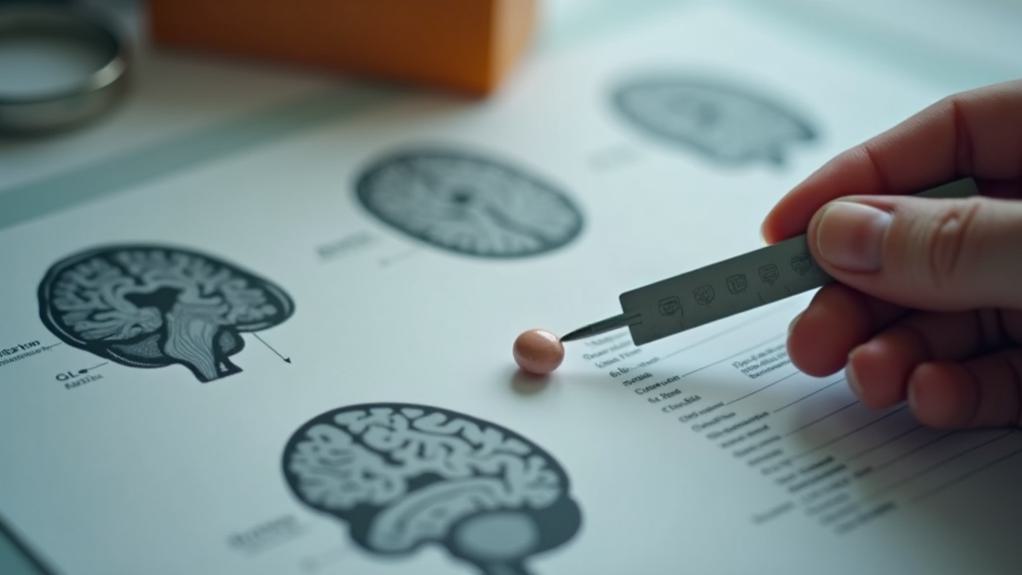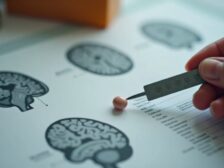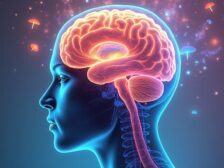
Precise doses are vital in depression treatment because they directly impact the efficacy and safety of medications. We've found that the therapeutic window for drugs like ketamine is narrow, requiring a delicate balance between symptom relief and side effect management. Individualized dosing is essential, as factors like weight, age, and medical history influence how a patient responds to treatment. By carefully monitoring and adjusting doses, we can optimize outcomes while minimizing risks. This personalized approach not only enhances treatment effectiveness but also improves patient compliance and long-term success. Understanding the complexities of precise dosing can markedly improve the overall treatment experience for those battling depression.
Understanding Ketamine's Therapeutic Window
When we consider ketamine as a treatment for depression, understanding its therapeutic window is vital. This window represents the range of doses that effectively alleviate symptoms while minimizing adverse effects.
It's important to recognize that ketamine's therapeutic mechanisms are complex and can vary among individuals. We've observed that ketamine's antidepressant effects typically occur at sub-anesthetic doses, but the precise amount needed can differ based on patient responses. Some may experience relief at lower doses, while others might require slightly higher amounts to achieve the same benefit.
This variability emphasizes the importance of personalized dosing strategies. Moreover, the therapeutic window for ketamine is relatively narrow. Doses that are too low may not provide sufficient relief, while excessive amounts can increase the risk of side effects or dissociative experiences.
We must carefully balance efficacy and safety, adjusting doses based on each patient's unique physiology and symptoms.
Dose-Dependent Effects on Depression
Building on our understanding of ketamine's therapeutic window, we must examine how different doses affect depression symptoms. The dose-response relationship is vital in determining therapeutic efficacy.
We've observed that ketamine's impact on depression follows a non-linear pattern, where both too little and too much can be ineffective or even harmful.
At lower doses, patients may experience:
- Mild mood elevation
- Subtle cognitive improvements
- Minimal side effects
As we increase the dose, we often see more pronounced antidepressant effects. However, higher doses can also lead to increased side effects and potential risks. It's a delicate balance that requires careful calibration for each individual.
We've found that the ideal dose varies among patients, influenced by factors such as body weight, metabolism, and the severity of depression. This variability highlights the importance of personalized treatment approaches.
By carefully titrating the dose, we can maximize therapeutic efficacy while minimizing adverse effects. Understanding these dose-dependent effects allows us to tailor treatment more effectively, potentially improving outcomes for patients with depression.
It's a complex process, but one that's essential for providing the most beneficial and safe treatment possible.
Minimizing Side Effects
With the goal of optimizing ketamine treatment for depression, minimizing side effects becomes an essential aspect of patient care. We recognize that side effects can greatly impact treatment adherence and overall patient well-being. By fine-tuning dosages, we can often reduce the intensity and frequency of unwanted effects while maintaining therapeutic benefits.
Common side effects of ketamine, such as dizziness, nausea, and dissociation, can be mitigated through precise dosing. We've found that starting with lower doses and gradually increasing them allows us to identify the minimum effective dose for each patient. This approach not only helps in symptom management but also reduces the risk of more severe side effects.
Moreover, precise dosing enables us to balance the drug's antidepressant effects with its potential for cognitive impairment or addiction. By carefully monitoring patients and adjusting doses as needed, we can maximize the treatment's efficacy while minimizing risks.
This personalized approach to dosing enhances the overall treatment experience, potentially improving long-term outcomes and patient satisfaction. Ultimately, our goal is to provide effective depression treatment with the least possible burden of side effects.
Optimizing Treatment Outcomes
Optimizing treatment outcomes stands as our primary objective in ketamine therapy for depression.
We've found that precise dosing strategies play an essential role in achieving this goal. By carefully calibrating the amount of ketamine administered, we can maximize its therapeutic effects while minimizing potential side effects. This approach allows us to tailor treatment to each patient's unique needs, ensuring the best possible results.
Treatment compliance is another significant factor in optimizing outcomes. When patients receive precise doses, they're more likely to adhere to their treatment regimen, leading to better long-term results.
We've observed that patients who follow their prescribed dosing schedule consistently show more significant improvements in their depressive symptoms.
To further enhance treatment outcomes, we focus on:
- Regular monitoring and adjustment of dosage based on patient response
- Educating patients about the importance of precise dosing and compliance
- Utilizing advanced drug delivery systems for accurate administration
Individualized Dosing Considerations
At the heart of effective ketamine therapy lies the principle of personalized dosing. We recognize that each patient's response to treatment can vary considerably, making tailored medicine essential in depression care. By customizing the dose to each individual, we can enhance therapeutic outcomes while minimizing potential side effects.
When considering personalized dosing, we focus on several key factors:
| Factor | Importance | Consideration |
|---|---|---|
| Weight | High | Affects drug metabolism |
| Age | Medium | Influences drug sensitivity |
| Medical History | High | Impacts safety and efficacy |
These factors, among others, help us determine the most suitable starting dose for each patient. We then carefully monitor the patient response, adjusting the dose as needed based on efficacy and tolerability.
It's important to note that personalized dosing isn't a one-time decision. Throughout the course of treatment, we continuously reassess and fine-tune the dose to guarantee the best results. This adaptable approach allows us to adjust to changes in the patient's condition, metabolism, or other factors that may influence their response to ketamine therapy.
Monitoring and Adjusting Doses
Vigilant monitoring forms the cornerstone of effective ketamine therapy for depression. We must closely observe patients' responses to initial doses and adjust accordingly to achieve the ideal therapeutic balance. This process requires a detailed understanding of each individual's dose response, as well as their unique physiological and psychological characteristics.
Throughout the treatment course, we'll continuously assess:
- Changes in depressive symptoms
- Side effects and tolerability
- Overall patient well-being
By carefully tracking these factors, we can fine-tune the dosage to maximize benefits while minimizing adverse effects. It's important to remember that the perfect dose may change over time, necessitating ongoing adjustments.
We'll employ various tools and techniques to monitor progress, including standardized depression scales, patient-reported outcomes, and clinical observations. This thorough approach allows us to make informed decisions about dose modifications.
If we notice inadequate improvement or unexpected side effects, we'll consider altering the dose or frequency of administration. Conversely, if a patient shows significant progress, we may investigate the possibility of maintaining the current regimen or gradually tapering the dose to find the minimum effective amount.
Safety Protocols for Ketamine Administration
While monitoring and adjusting doses is key, we can't overlook the importance of strong safety protocols in ketamine administration for depression treatment. Administering protocols are designed to guarantee patient safety and maximize the therapeutic benefits of this powerful medication.
We must first conduct thorough patient screenings, including detailed medical histories and physical examinations. This helps identify any contraindications or potential risks. Before each treatment session, we carefully assess the patient's essential signs and mental state.
During administration, continuous monitoring of heart rate, blood pressure, and oxygen saturation is critical. Our protocols also include specific guidelines for the treatment environment. We provide a calm, controlled setting with appropriate medical equipment readily available.
Staff trained in emergency procedures are always present during ketamine administration. We've established clear criteria for patient discharge, including stable essential signs and mental clarity.
Post-treatment follow-ups are scheduled to monitor for any adverse effects and assess the treatment's effectiveness.
In Summary
We've investigated why precise dosing is critical in ketamine treatment for depression. It's clear that finding the right therapeutic window balances efficacy and safety. We must carefully consider individual patient factors, monitor responses, and adjust doses accordingly. By adhering to strict safety protocols and optimizing treatment regimens, we're better equipped to maximize benefits while minimizing risks. Ultimately, precision in ketamine dosing is key to improving outcomes for those struggling with depression.











